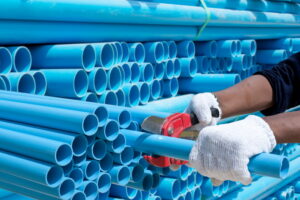No commercial facility has only a single type of piping material in it. Different materials serve different functions, and some facilities may have specific piping requirements. One example is process piping used in many manufacturing plants: these pipes may need to transport gas, sugar, chemicals, etc.
We’re not going to focus on process piping in this post. We’re going to address the common piping found in the majority of facilities and when these facilities may need repiping done. We work with all types of commercial piping in Chicago, and we’re ready to help you with making important upgrades.
The Most Common Commercial Pipe Materials
- Copper: Used in commercial buildings for water supply lines, both for hot and cold water. It offers durability, corrosion resistance, and flexibility, making it suitable for a wide range of plumbing applications.
- Galvanized Steel: Galvanized steel pipes are coated with a layer of zinc to prevent corrosion. They are often used for water supply lines and fire sprinkler systems in commercial buildings. However, they’re gradually being replaced by other materials due to concerns about corrosion and mineral buildup.
- Stainless Steel: Stainless steel pipes are known for their corrosion resistance and durability. They are commonly used in commercial buildings for water supply lines, heating systems, and sanitary applications where cleanliness and hygiene are important.
- PVC (Polyvinyl Chloride): PVC pipes are common in commercial buildings for drainage, waste, and vent systems. They are lightweight, cost-effective, and resistant to corrosion and chemical damage.
- CPVC (Chlorinated Polyvinyl Chloride): Similar to PVC pipes, but specifically designed to handle higher temperatures, making them suitable for hot water distribution systems in commercial buildings.
- PEX (Cross-linked Polyethylene): PEX piping is a flexible plastic tubing used in commercial buildings for water supply lines, heating systems, and radiant floor heating. It’s easy to install, resistant to corrosion, and can withstand freezing temperatures.
- HDPE (High-Density Polyethylene): Commonly used for underground water and sewer lines in commercial buildings. They’re durable, resistant to corrosion and chemicals, and have a long service life.
When to Upgrade Your Facility’s Piping
Watch for these indications you may have outdated or damaged pipe materials:
- Frequent Leaks or Pipe Failures: If your facility experiences frequent leaks or pipe failures, it may be a sign of deteriorating or corroded pipes. Repiping can help address these issues and prevent future problems.
- Changes in Water Quality: Discolored water or a metallic taste can indicate corrosion or deterioration of pipes. Repiping may be necessary to improve water quality and ensure the health and safety of building occupants.
- Low Water Pressure: Low water pressure throughout a commercial building can be a sign of pipe blockages or restrictions due to corrosion or mineral buildup. Repiping can help restore proper water flow and pressure.
- Aging Infrastructure: If your commercial building has older plumbing infrastructure, it may be more susceptible to corrosion, leaks, and other issues. Repiping can help modernize the plumbing system and improve its reliability and performance.
- Renovations or Expansion: When renovating or expanding a commercial building, it may be necessary to upgrade or expand the plumbing system. Repiping can ensure that the plumbing infrastructure meets the needs of the updated space and complies with current building codes.
- Compliance with Regulations: Changes in building codes or regulations may require you to replace outdated or non-compliant piping materials.

